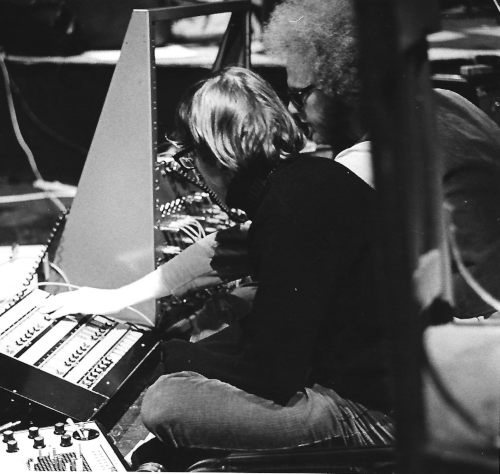November 2000
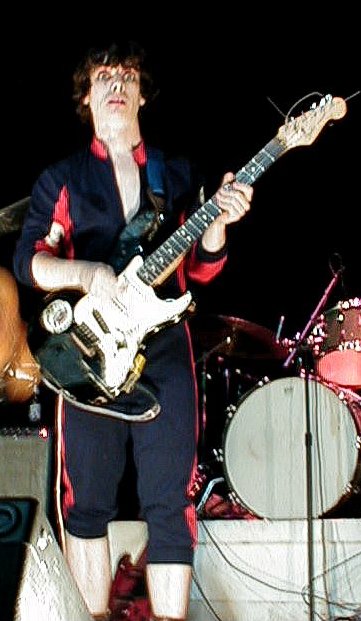 Bobby Conn does his very best to be the model of a post-Modern underground superstar. His two albums to date, Bobby Conn and Rise Up!, have placed him somewhere in a grey area between parody and genuine adulation of crooners, cabaret singers and all-round stars of the spangly stage. This interview took place after his New Orleans gig in November 2000, and as Bobby remarked “I could talk for hours about my favourite subject – myself!”. Fortunately, what the creator of the Continuous Cash Flow System has to say in person is usually as entertaining as his remarkable songs.
Bobby Conn does his very best to be the model of a post-Modern underground superstar. His two albums to date, Bobby Conn and Rise Up!, have placed him somewhere in a grey area between parody and genuine adulation of crooners, cabaret singers and all-round stars of the spangly stage. This interview took place after his New Orleans gig in November 2000, and as Bobby remarked “I could talk for hours about my favourite subject – myself!”. Fortunately, what the creator of the Continuous Cash Flow System has to say in person is usually as entertaining as his remarkable songs.
FREQ: What was the main motivation for you to start out portraying this particular image you have, as Judeo-Christian Edutainer, as a sort of Antichrist cabaret singer?
Bobby Conn: Egomaniacal delusions that I’ve had since I was a kid – I tried to hyperbolize them to see how far it would go. To me when I came up with the whole idea of trying to promote myself as a potential Antichrist I figured that no-one is going to take this seriously or even acknowledge it because it’s about the dumbest thing you could say. I grew up in in the late Seventies and early Eighties listening to American Punk Rock which is integrity based, you know. We used to take Rush albums and Styx albums and totally make fun of them ‘cos they’re so fucking foolish.
FREQ: They’re inherently weird
BC: Yeah, and just mock them because they’re not real. As a teenager I was into what’s “real” – real people suffering because they don’t have a job, real people having fucked-up problems and all this sort of stuff. So I was into all this Punk Rock stuff, this integrity shit – you write only about your harshest, most real-life teenage angst experiences.
FREQ: You did that?
BC: Yeah, I did that – I had a band called the Broken Cockamamies in high school and we had all these things – the only thing is, the problem was that bands like Black Flag were writing songs about getting in trouble with the police, getting beat up by skinheads and all this stuff, and I was growing up in the Mid West in this little town where none of that was happening. So all of this integrity, reality stuff that I was really experiencing was really, really fucking boring. So I got caught in this trap of thinking I want to be, like, real, but the real shit to write about is boring. So then I realised as I started going to shows in Chicago and stuff and seeing these other bands, and listeing to these other Punk bands who were also emulating the Sex Pistols and all that stuff, they’re writing all this harsh stuff, reality songs, and none of that shit is real either, because basically they were musicians and the lyrics become metaphors for anger. The stuff they’re talking about for the most part doesn’t actually happen. It’s also just fantasy, so I started to reassess what bands like Styx and Rush were doing. In a certain way they’re more honest, they have /more/ integrity because they’re not pretending that any of this shit is real, they’re just making something up, and it’s entertainment. The other thing is that I met this guy through the mail, Greg Turkington, who’s associated with Neil Hamburger, I don’t know if you know him?
FREQ: No, I don’t…
BC: He’s a comedian. He turned me on to Richard Harris‘ solo records. Jimmy Webb had all these songs and he needed a singer to do it, and I don’t know if he picked Richard Harris or the record company assigned Harris, but they came together, and the records – they’re insane. “MacArthur Park”, that’s the biggest, and it’s just so over-dramatic. Harris’ singing, and the song itself is so surreal in its imagery. I’m listening to all this super-extreme Punk Rock about heroin and all this shit, and Greg’s point was “what really is more shocking: Richard Harris singing – and he can’t sing, he’s an actor, an Irish actor – about a cake melting in the rain; or some junkie singing about his heroin problem?” Which is really more weird and shocking? And I was like – you’re right. The junkie guy is full of shit – Jimmy Webb is way more bizarre than Black Flag will ever be. Then also the music is so much more elaborate. I grew up as a kid with parents who are total Classical music heads, that was all we ever listened to, that and The Beatles.
FREQ: An interesting combination to have as influences on Punk…
BC: Yeah. even as Punk Rock, my band’s songs were always too complicated and had too many changes and dynamics to really register as satisfying Hardcore for anyone, so I just extrapolated out of that.
FREQ: When you said Jimmy Webb, that made me think of Glen Campbell doing “Wichita Lineman” – I mean, what is that about?! It’s apparently about someone who’s working on the phone line, but it’s about reality and it’s not at the same time.
BC: “Witchita Lineman”, on just a purely literal thing – a lineman is a guy who works on a telephone line and he’s like I guess listening in to conversations or something, It’s a very extended metaphor that you could never get it, but it doesn’t matter because the song is so beautiful. (sings) “I am a lineman for the county”
FREQ: What’s also remarkable about that song is not only that it was written, performed, recorded and released, but that it’s now a standard. It’s everywhere; in pubs in East London, it’s on the jukebox, and people sing along with it.
BC: The other nice thing for me about that Glen Campbell song, and what I’m interested in with singers like Campbell, Richard Harris and Tom Jones, is the fact that they don’t really seem to understand what the song is about, which actually adds to their interpretation of the song. I don’t think that Glen Campbell is ever thinking when he’s delivered that song – like when someone plays him the demo he thinks “What’s my motivation” – he’s not trying to method act his way through it. He just does it. But it comes across as having so much more emotional content than is really there. All those things just tear me up inside; trying to figure out a way to say something that’s meaningful to me but to understand that it’s the craft which puts it across more than anything else.
FREQ: So it’s the interpretation and the development of the process of composing a song that interests you?
BC: Yeah, ultimately I would like to think that. I was telling another interviewer just now, he was surprised about how much of a bummer I was to talk to, and he said “Judging from all your music you’d think that you’d be more positive, upbeat” – and a lot of times I am more in an upbeat mood. I’m not in an upbeat mood right now, but the main thing is – you don’t really read the lyrics! Did you read the lyrics? and he’s like “I guess not”, because to me the lyrics are relentlessly bleak!
FREQ: There’s a lot of bleakness, and darkness in them. They’re just /not/ positive!
BC: Yeah, but you know I’m not interested in Nick Cave who has bleak lyrics sung in a bleak way. I want to be joyful, because that’s my preferred method of emoting, that’s what I’m best at. I don’t think I could ever be a good straight ballad singer – maybe when I’m fifty. So there’s always that contradiction – I have such a fucking love-hate relationship with the whole thing. I’m like this singer guy – the lights are on you because you’re singing and I think about probably any really great entertainer I would imagine is not as horrifyingly self-analytical and self-aware as I am; I would hope not. I think that lack of self-awareness is a prerequisite to be a true superstar, because it bogs you down. I can’t finish the record I’ve been working on currently for over a year now because I keep on winding my way back, spiralling. I just get into these paranoid spirals. This is horrible confessional shit – I’m not all that interested in that as propagating the persona of Bobby Conn! I just feel like so many times when I read other interviews with people they just don’t really seem to deal with that directly – that it is by definition and ego-trip to go up on stage and sing your own songs.
FREQ: That’s also something that comes out from reading the lyrics of your songs, and more so actually through hearing the songs, that you are dealing with that issue. The whole thing of saying “Look at me, I’m here” – like the song “Payback” with the chorus “I’m Bobby Conn!”
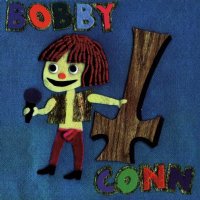 BC: Right. Well, that song is actually a song I wrote in New Orleans when I was living here,and it’s actually me trying to pump my ego up after this horrible incident where I was held up at gunpoint. I gave the guy my wallet and he still had me by the shoulder and was gonna drag me into the alley – so I ran, and he ripped my shirt off. I felt it would be better to get shot in the back than to be down on my knees in the alley as he’s either gonna rape me or I don’t know what the fuck he was planning to do. I wasn’t going to stick around to find out.
BC: Right. Well, that song is actually a song I wrote in New Orleans when I was living here,and it’s actually me trying to pump my ego up after this horrible incident where I was held up at gunpoint. I gave the guy my wallet and he still had me by the shoulder and was gonna drag me into the alley – so I ran, and he ripped my shirt off. I felt it would be better to get shot in the back than to be down on my knees in the alley as he’s either gonna rape me or I don’t know what the fuck he was planning to do. I wasn’t going to stick around to find out.
FREQ: Whatever it was it wasn’t going to be good
BC: So I was figuring out, how do I get over it – when I told that story to so many people they said “Oh man, you need a gun!” – that was most people’s reaction. If you had a gun, you would have been able to deal with that situation.
FREQ: No you wouldn’t – you would need a chance to get the gun!
BC: I would have had to have the gun in my hand to deal with that situation. I don’t want to live my life where there’s always the possiblity of deadly force. It doesn’t seem like a very human way to live, but how do you maintain confidence when you’ve faced down the possibility of death?
FREQ: Not just the abstract idea of it, but the actual possibility of it.
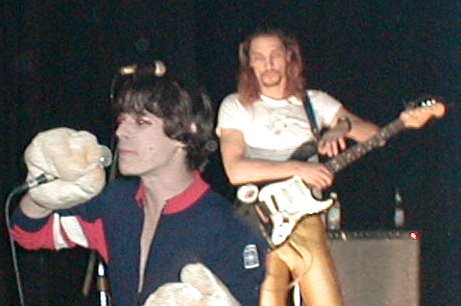 BC: So it’s like a whistling in the dark – most of my songs are whistling in the dark
BC: So it’s like a whistling in the dark – most of my songs are whistling in the dark
FREQ: Do you have an intention to transmit specific messages to the listener? There’s defintiely something there…
BC: I kind of have two kinds of songs – on Rise Up! I had a lot of songs where I was using a lot of Christian imagery more as a sort of social or political commentary.
FREQ: The whole Anti-christ thing
BC: Yeah, and my despair at the amount of inequality that there is in this country in particular, and how the whole American Way is based on the idea that competition is the solution for everything. This new material I’m working on is – like that funky song I did tonight, “No Revolution”, – is very much more of a death blow to that.
FREQ: That song seems very much more bleak because there is no possibility of redemption coming through the revolution
BC: Yeah (laughs), I just don’t feel it – the election we’re in right now is not ending – we have two nearly-identical candidates, although I have to say that George Bush is a far worse prospect…
FREQ: It’s a choice of the lesser of two evils
BC: Right – Bush is much more evil. I voted for Gore, but the fact that – and this is unprecedented in American history – this really has the potential to really tear the country apart, because no-one’s had to deal with this directly – they’re gonna fight about this; I mean they’re really gonna fight about it. If a Presidential election is decided in the courts, it set a precedent which is so weird in American democracy. It’s very un-American, that a judge or some judicial mechanism would decide.
FREQ: A decision made by Federal judges who are appointed for life by the administrations over the years.
BC: That’s why it’s such a big deal if Bush gets to appoint more Supreme Court judges – those judges will be there for forty-fifty years. Clarence Thomas is going to be around for a long time. It’s very odd, and there’s a lot of undercurrents of anger about that, and yet the media and the news are always hammering home that we’re Number One, that the American economy is the best economy in the world, and not only that, it’s the best economy we’ve had
FREQ: The best of all possible economies.
BC: That becomes an ideology and a religion all unto itself. You can’t really have a discussion without agreeing on that truism, and I think it really precludes change. The people who supported Ralph Nader notwithstanding, the amount of de facto complacency in this country is astounding. it really is, it’s astounding.
FREQ: Is that what you’re trying to address?
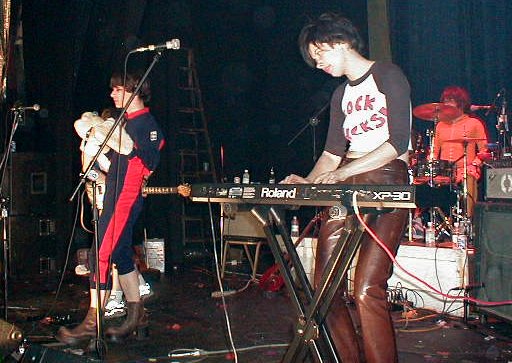 BC: I’m trying to address it, and I’m not really presenting any kind of a brave or bold solution. I’m just sort of stating it, stating my despair, basically. But I’m trying to do it in an upbeat, danceable way!
BC: I’m trying to address it, and I’m not really presenting any kind of a brave or bold solution. I’m just sort of stating it, stating my despair, basically. But I’m trying to do it in an upbeat, danceable way!
FREQ: Is it true that you had done a residency in Las Vegas, or is that a rumour?
BC: No, that’s not true – I would love to do that. I’ve lied a lot to the press, because I think that – and forgive me, but I have thought so – for me, it’s really depressing that there’s a lot of people who are pretty bright who are pursuing Rock journalism, Rock publicity, entertainment industry stuff as a career. I find it troublesome. I don’t really consider what I’m doing a career, it hasn’t really worked out that way in terms of money. If it ever does, that’d be great, but it’d be a pure coincidence. It’s really more of a compulsion – I’ve been writing songs and performing them for whoever I can keep in the room to hear them since I was ten years old. So I think that’s more of a personal genetic mental defect, rather than a career.
FREQ: How do you manage to keep on touring and recording?
BC: Well, I’ve never graduated, I don’t have a degree or anything, but I’ve managed. In Chicago, I’ve lived there a long time, and there’s a broad network of other people who are artists, entertainers and musicians. I can do welding, I can do carpentry, install artwork. These days I’m working as a welder and metal worker, just like Jennifer Beals in Flashdance. And at night… the eagle flies, my friend! I’m trying to get out of manual labor because I’m 33 and don’t really have the physical strength to see myself as a manual-style laborer in my forties and fifties. I think I’m smart enough not to have to do that. I’ve lucked into some pretty lucrative, crazy, computer-oriented work that has payed the bills. Being on Thrill Jockey has really helped – it’s a great label. Bettina Richards who runs it, her interest is foremost that the people on the label are able to get as much of what little money there is to be made. For someone like me who sells thousands of records, I can actually make more money than people who are on other labels who I won’t name who sell tens of thousands of records.
FREQ: That’s excellent.
BC: It’s great, it’s a very special thing about Chicago. The music business is so depressing to me. I feel guilty that I have a booking agent. The reason why I have a booking agent is that the guy who books stuff for me, Christian, is a really good guy. I like him, he’s a friend, so if he quit I don’t think I’d have a booking agent. Every other booking agent I’ve met has been really really creepy. It’s sad the amount of major label-style promotion you have to do, even on this indie label. Bettina has a staff of eight people full time that do all the promotional crap.
FREQ: They’re a well respected label.
BC: One of the reasons they’re well respected is because they’re that organised in a purely business sense. She’s a really good person – I could never do that – I have all my music copyrighted but I haven’t even been able to register it with ASCAP and BMI which is stupid because I’m now realising that this stuff is actually getting airplay. But I never bothered to fill out the forms
FREQ: How have you found the level of commercial success you’ve had? Didn’t you get some MTV airplay?
BC: That was because there were some people at MTV who took an interest, like why you’re talking to me. Not becuase this Bobby Conn character is really hot, he’s got a big draw – it’s because you found it somehow, you’re interested and here you are. That how pretty much everything in my career so to speak has happened. The stuff with Jim O’Rourke happened because we live in the same town, he thought what I did was funny and cool and thought it would be fun to make a record together. We did it, and it’s great.
 FREQ: Rise Up? It’s a fantastic album. It desevers to be recognised as a stone-cold classic, no question.
FREQ: Rise Up? It’s a fantastic album. It desevers to be recognised as a stone-cold classic, no question.
BC: Well, maybe it’ll be one of those ones that when I’m fifty or so there’ll be an elegant retrospective in a high-class music afficianado magazine, and it’ll do me no good. But whatever, it’ll be nice when it happens. I’m in it for as long as I want to do it. I’m really happy this tour, this show notwithstanding, and this show I don’t consider it a failure or anything
FREQ: It sounded pretty good from in the audience.
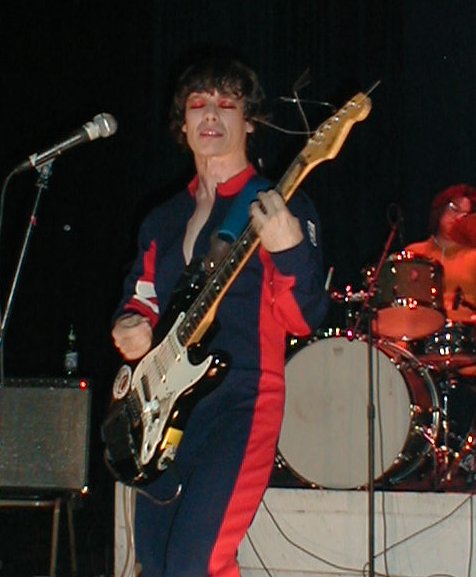 BC: Right, but we just did three shows in Texas and for whatever reason people really seemed to like us there, so the crowds were super-enthusiastic and in a certain way I think a lot of tonight was like we played exactly the same level of energy that we played last night for three times the people with three times the excitement and so we’re kind of just thinking “Well it’s not us, it must be them!” (laughs)
BC: Right, but we just did three shows in Texas and for whatever reason people really seemed to like us there, so the crowds were super-enthusiastic and in a certain way I think a lot of tonight was like we played exactly the same level of energy that we played last night for three times the people with three times the excitement and so we’re kind of just thinking “Well it’s not us, it must be them!” (laughs)
FREQ: You could be right actually! There wasn’t much of a crowd and the way the DJ just tried to cut you short was irritating.
BC: Well there it is, we are right! But the thing is, I hope I wasn’t too petulant about it becuase I don’t think that it really does anyone any good to be petulant on stage – unless you’re Dylan!
FREQ: Isn’t there also something in that petulance in itself that is part of the entertainment?
BC: Well, I think so because I’ve always had this theory about when Frank Sinatra was still alive, which would you rather see? Frank Sinatra go out and sing a song, or Frank Sinatra have a problem with the teleprompter and start freaking out and cursing?
FREQ: But it also brings into question what the nature of entertainment is, becuase you’ve got some people on the stage and you’re coming along and expecting a programmed entertainment and then you get something that is other than that, which is fucked up and more spontaneous.
BC: Right, right, my theory is that when things go bad, and I’ve let things really dissolve until I’m like a little puddle of misery on the stage – and I don’t do that any more because it’s too painful personally, but tonight … It’s not really within me to pretend that any show is like any other show. If you go to a Jackson Brown show, he really could care less how the audience reacts.
FREQ: It’s a production line at that sort of event – you give me the money, I do the show….
BC: The whole idea of the encore for instance, we don’t leave the stage for encores any more, we just stay on stage and stand there rather stupidly and say “OK, now we’re gonna do… the encore, ‘cos you love us so much. You’ve been such a great audience.” I mean, it’s so perfunctory. The other thing I like to do with an encore – I used to have these sheets of black fabric, and I’d just put them over my head, take them off and say “OK, and we’re back!”
FREQ: So much of going to a gig involves seeing the band play their set which they’ve played however many time before for however many different audiences, and they go off and wait until they get a certain amount of applause. The venue were doing this tonight over the venue PA – “Do you want some more Bobby Conn?”
BC: The MC was doing that – it’s like, I can do that fine. I think it gets more pathetic to say “anyone who wants to hear another song raise their hand” or something (laughs). It’s more sad, especially as we all come Glammed-out, and then the Glam quotient just goes (makes sound of deflating rockstar). That’s what I would love to see – did you ever see that Message to Love? The Isle Of Wight movie? It was the 1970 Isle of Wight concert, and it was a horrible fiasco – the promoters wanted to do a Woodstock, and the fans came to the barricades, and just walked over them. No-one paid, and the promoters had guaranteed all these acts a bazillion Dollars and they lost their ass. They were freaking out, thay tried to get the police to clear the crowd but that didn’t work as there were too many people. There’s so many great performances, like Kris Kristofferson getting heckled to the point where he just leaves the stage because he just can’t deal with it.
FREQ: That’s probably a good thing.
BC: It is good thing – he was terrible. There’s Jim Morrison barely able to stand up, there’s The Moody Blues doing the limpest version of “Nights In White Satin” for an audience of sleeping people – and then there’s amazing things like Emerson, Lake and Palmer‘s first show, they’re all dressing gold spangles, and Keith Emerson has got the Hammond B3 and he’s whipping that thing around like it’s a guitar – and I think it weighs like 600lbs – and I was amazed. I thought they were stolid Prog Rock and I thought “Whoa! They’re putting on a show!”
FREQ: All the footage of ELP seems to show them doing something like that – and if that was their initiation, no wonder.
BC: Yeah, to see the range of performances where everyone in the show was a super-dooper-ooper-star, but some of them really blew chunks! Others of them were amazingly inspired – and that’s live performance. Everyone has shows that are not transcendent, and I like to make my shows that are not transcendent, I like to make the audience involved, letting them know that this is not transcendent – deal with it. Of course there are a lot of other bands that go to a lot of trouble to make sure that none of their shows are transcendent, and that’s kind of a bummer too, by staring at their shoes.
FREQ: Or bands who play their current album, note perfect. Come along, see the show, go home and not get anything more or less than that.
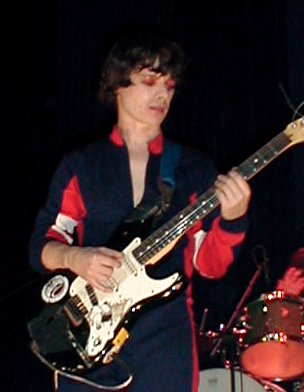 BC: I admire consistency – it’s not my strong point. I’m always battling my guitar and everything else.
BC: I admire consistency – it’s not my strong point. I’m always battling my guitar and everything else.
FREQ: Do you see the ultimate point of doing what you do as being on stage in front of an audience, or in releasing albums?
BC: Yeah, the albums are more like purely masturbatory. The albums I love the most are the ones that really only exist as albums, those are the ones I like to listen to the most. With the exception of maybe The Ramones‘ live album, which is their best record
FREQ: The Ramones live are completely different because it’s about ten times as fast.
BC: Right, exactly. But it’s exactly the same each time. I’m not interested in capturing the integrity of a live performance on a record. I love the technology that allows you to do overdubs, like Queen made these vocal symphonies you could never do in reality.
FREQ: One of the things about the group you’ve got together is that you’ve got four people on stage who are playing something that is as effective, in that moment, as when you do it on an album. It has the same build up, the same emotional impact.
BC: Yeah, you’ve got to have the same dynamics. I think there are occasions when I’ve written some melodies that are pretty good, but I think the thing I’m best at is making sure that dynamics are present at every moment. So much, especially guitar Rock, like these days Indie Rock, it’s strum, strum, strangalangalang, it’s this flat line.
FREQ: You can either have a flat line, or chorus verse chorus verse, end, applause.
BC: Yeah, so I’m trying to have as much variation as possible. One of my favourite records, like The White Album, that album is so fucking schizophrenic, especially the Paul songs – they’ll have eight bars of Reggae in the middle of the song and then thie symphonic little bit.
FREQ: Driving aroung New Orleans, listening to the radio, The Beatles would come on, and I’d think, “Oh, yeah I know this song”, and then I’d listen to it from the fact of being in a car having to listen to the song because there’s nothing else around, and you’re stuck on the freeway or highway. Then listening into the depths of the songs, there’s all these weird things coming up out of the music that makes their sound somewhat different to manufactured Pop music. There’s so much going on in there that changes, that drifts, and how did they even think of that?
BC: I think they were guys that played enough good-time Rock and Roll and were smart enough to realise that got kinda boring after a while. My attention span is really short for playing one kind of thing and I think in the worst case it makes me jack of all trades and master of none, but in the best case it’s this great melange.
FREQ: It’s also the whole condition of the modern world…
BC: The Post-Modern world!
FREQ: You’ve got everything to draw on, but what are you going to draw on when you can use anything you like?
 BC: Yeah, I mean it’s like, you’ve seen two different bands; Jonathan Joe was playing in London, but Weasel was playing the bass and I had a different drummer, and the band had a totally different vibe to this band. The last time I went to Europe I had my friend DJ LeDeuce (from R.O.M.E.), and thats much more of an intimate thing, much more Cabaret style, and I’ve done stuff where it’s all strings. I like to change: there’s so many great people in Chicago who play great music that it seems a shame not to try to play with them.
BC: Yeah, I mean it’s like, you’ve seen two different bands; Jonathan Joe was playing in London, but Weasel was playing the bass and I had a different drummer, and the band had a totally different vibe to this band. The last time I went to Europe I had my friend DJ LeDeuce (from R.O.M.E.), and thats much more of an intimate thing, much more Cabaret style, and I’ve done stuff where it’s all strings. I like to change: there’s so many great people in Chicago who play great music that it seems a shame not to try to play with them.
FREQ: How do you get in contact with them?
BC: The thing is, I’m not so special in Chicago. This happens with everyone in Chicago. If you’re in Chicago, Jeb Bishop who’s an amazing trombone player, and anytime anyone has an idea for a trombone part of any kind, you can call Jeb and ask him to do it and unless you’re a total asshole or it’s something really stupid, he’ll do it, ‘cos he likes to play. It’s not about the money, he likes to get payed for his time, but it’s not like “I don’t do that”. I mean in New York for instance, there’s a bazillion great musicians, but a lot of them are Jazz guys who say “Oh, I don’t do that, I’m a Jazz guy, I don’t do that” whereas in Chicago, the Jazz guys and the Rock guys and the electronic guys, the HipHop people all play together. The cross-pollenation is really insane there
FREQ: It’s hard to keep track of…
BC: It’s hard to keep track of, and I don’t really think it should be kept track of, because I read a lot of reviews about Chicago release where people are trying to figure out the political implications of why certain groups of people playing with each other, you know? When someone that doesn’t seem to fit in with one group plays with another group it must indicate something. And it really doesn’t, because the community there is quite small. So it really is a matter of someone asking someone in a bar “Hey, would you like to do this show? I’ve got this great idea” and they’ll be like “I can do that, let’s do it” and that’s it. Also, the great thing for me is there’s, for better or worse, no band bands in Chicago right now. People don’t say “We’re a band, we play with each other, we’re making this monolithic thing, that’s what we do, we don’t play with anyone else”.
FREQ: Did you get involved with any of that when you lived in New Orleans?
BC: No, because New Orleans is not like that. You can do a lot of pickup playing in New Orleans style, standard style stuff, but, at least when I was here in ’93, there’s nothing else. You also have to understand I was going through a horrible problems with my marriage at the same time, so that wasn’t the key thing on my brain, but it was not a very fertile city for experimental music – then. Now it is, but a big part of it is because of Mr Quintron – and Quintron is from Chicago. So he did all that stuff in Chicago, and in New Orleans he blossomed. New Orleans is perfect for him, because he can be Mr Quintron 24 hours a day, which he can’t be in Chicago. The culture there won’t let you be a persona. I’ve seen Mr Qunitron teach grade school kids science, an he teaches them as Mr Quintron, and his employer doesn’t say “Oh no, you can’t call yrself Mr Quintron – you have to have a first name and a last name, you can’t go to school with shaved eyebrows and little Q insignia on your jacket” – but in New Orleans, you can. You can do anything you want here. But that’s really his doing, I think he really made that happen, and he’s brought in all this weird experimental noise shit, but he also does this stuff with these great old-time artists, these R&B guys in their 60s and 70s.
FREQ: Playing with them?
BC: He doesn’t play with them like they’re in a band together, he puts them on the same bill, supports them. That’s really great, I think that Quintron was a real key part of getting that started in Chicago and he’s been a key part in getting that started here. We’ve all benefitted from that, and I’ve tried to keep that alive. There’s no band that I’ve ever had that’s had the same number of memebers for more than 6 months or a year.
FREQ: Is this why you do stuff as Bobby Conn rather than as a band?
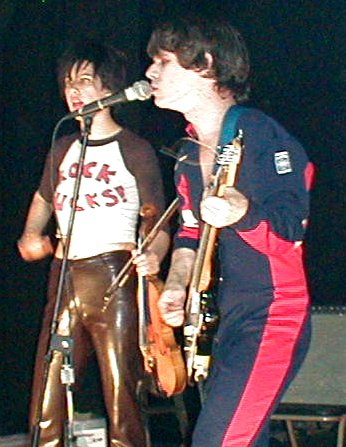 BC: Yeah, but I’m also a megalomaniac, a control freak, and I want to hear my songs as I imagine them. and so for me making a record is more like a process of casting. I know a lot of musicians, I think I know how they play – sometimes I’m wrong and some things don’t work out – but I’ll think “This song would be great if Michael Zoran played on this song because he’s so great at doing his thing” and I can ask him to do that. Ideally it works out that everyone’s doing what comes naturally to them, and not trying to do something they’re uncomfortable with. I want to cover a wide range of stuff. My drummer, Colby – he’s from Lincoln, Nebraska, and he’s a real find, because he actually knows and wants to Rock, but he also can play Bossanovas and stuff. even though he’s not from a Jazz background or anything, he a broad enough musician that he can do that, which is not true of most Rock drummers. Some great Rock drummers are not going to able to do much with a Bossanova, That’s what’s so exciting, like playing with Monica, I come up with these little melodies and she can harmonise anything, and then she can add counterpoint too.
BC: Yeah, but I’m also a megalomaniac, a control freak, and I want to hear my songs as I imagine them. and so for me making a record is more like a process of casting. I know a lot of musicians, I think I know how they play – sometimes I’m wrong and some things don’t work out – but I’ll think “This song would be great if Michael Zoran played on this song because he’s so great at doing his thing” and I can ask him to do that. Ideally it works out that everyone’s doing what comes naturally to them, and not trying to do something they’re uncomfortable with. I want to cover a wide range of stuff. My drummer, Colby – he’s from Lincoln, Nebraska, and he’s a real find, because he actually knows and wants to Rock, but he also can play Bossanovas and stuff. even though he’s not from a Jazz background or anything, he a broad enough musician that he can do that, which is not true of most Rock drummers. Some great Rock drummers are not going to able to do much with a Bossanova, That’s what’s so exciting, like playing with Monica, I come up with these little melodies and she can harmonise anything, and then she can add counterpoint too.
FREQ: That came through tonight when you were sitting down on the stools just playing.
BC: She can just add all this stuff in there, effortlessly, and it’s so great, it’s stuff I could never think of myself, you know?
FREQ: You’re not sush a megalomaniac that you’re not going to allow external influence when you’re all playing together?
BC: No, I need it but I feel like it’s like Robert Altman I guess; when he figures out who to use to make a movie, he has the characters in mind and he figures out which actors would most naturally fit the character. Not get a great actor and force them into the part. That’s kinda the way that I like to think.
FREQ: Where do you think you can take this?
BC: I don’t know. I think that I’m just going to continue on making music. Eventually one of two things will happen: I’ll run out of ideas – I think that’s kind of unlikely – or… I don’t know. But it’s not for me to guess at what is likely to become popular or successful. For instance, Tortoise is a really good example, because it became a really big deal, but if you ask Bettina about the story of Tortoise, she was as shocked as anyone else that that band took off.
FREQ: It seems with Tortoise that there’s a whole bunch of people who do a whole bunch of things, and that’s the formation that got the particular attention.
BC: Those guys are all great, fantastic players, and they’re all doing these different things, and Tortoise was like their fun jam band basically, that just blew up because they made a record that happened to resonate.
FREQ: Probably because they were having fun…
BC: Yeah. they were having fun.
FREQ: Are you having fun?
BC: I’m really having fun; I’m really having fun on this tour, and I’m really having fun with this band, because I have been playing with a DJ for the past year, so this is the sixth show with this band; it’s great to be able to play the old songs in a new way, and play these new songs, and figure them out, because I’m still not done with the record. When we’re done with this tour we’re going to finish it!
FREQ: I was going to ask you about the Lovessonngs EP, what do you feel about that? Jonathan said that he felt it was maybe not a complete thing of itself.
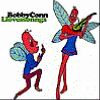 BC: Well, it was not meant to be, it was meant to be my take on a shorthand version of Nilsson Schmilsson‘s record and if you’ve ever listened to that record – Oh man, you should listen to it! It’s got two great songs – “Without You”, which is a Badfinger cover, and “Jump Into The Fire”, which is like a No-Wave song from Nilsson. It’s super distorted (Imitates heavy guitar riff), a super Rock song, when you hear it it’s like “This is Nilsson?” It doesn’t sound like Nilsson at all – but it also has “You Put The Lime In The Coconut”. The range of the record from like horrible cheese to brilliance – it’s bizarre. Almost all of his records are like that, he just wrote songs, he liked them, he recorded them, he didn’t care whether they fit together. He wan’t working on concepts, he named his records things like Nilsson Schmilsson, and Son Of Schmilsson, and A Little Touch of Nilsson Schmilsson In The Night – this is not a man who’s taking himself all that seriously.
BC: Well, it was not meant to be, it was meant to be my take on a shorthand version of Nilsson Schmilsson‘s record and if you’ve ever listened to that record – Oh man, you should listen to it! It’s got two great songs – “Without You”, which is a Badfinger cover, and “Jump Into The Fire”, which is like a No-Wave song from Nilsson. It’s super distorted (Imitates heavy guitar riff), a super Rock song, when you hear it it’s like “This is Nilsson?” It doesn’t sound like Nilsson at all – but it also has “You Put The Lime In The Coconut”. The range of the record from like horrible cheese to brilliance – it’s bizarre. Almost all of his records are like that, he just wrote songs, he liked them, he recorded them, he didn’t care whether they fit together. He wan’t working on concepts, he named his records things like Nilsson Schmilsson, and Son Of Schmilsson, and A Little Touch of Nilsson Schmilsson In The Night – this is not a man who’s taking himself all that seriously.
FREQ: He was in a position to do that as well, he’d got a label who put the stuff out.
BC: Yeah, but he’s also probaly one of the ten most gifted singers of his generation, you know? It doesn’t hurt. He also was lucky in that his first record would probably been fairly much ignored if it wasn’t for the fact that all The Beatles had declared it at a press conference to be their favourite record. That was like his career right there, it took off and all of a sudden people said “It’s a great record” but otherwise people wouldn’t have listened to it. Yeah, so it’s all those things, but I do really idolise him, because he did a lot of commercial music, he did a lot of music that was strictly for hire, and he did a lot of cheesy stuff, but he didn’t really take it all that seriously. I’ve listened to “Without You” too many times. To my mind, I can hear him laughing, I can hear him undestanding how ridiculously over the top those lyrics are, because he’s almost jaunty in his delivery in a way.
FREQ: Because he’s self-aware.
BC: Yeah, he’s super self-aware, I mean it’s like he wrote that other song: (sings) “You’ve broken my heart/you’ve torn it apart/so fuck you. Fuck you.” and he sings it so smooth the “fuck you” doesn’t jump out at you until a little bit later. So it’s like “What the fuck?!”, what did he mean to say? I think to me that light touch is something I’m working towards. I don’t know, frankly, if I have a sunny enough disposition innately to be Harry Nilsson, but what the fuck, y’know? But that was that record, that was my take on it, I wanted to interpret “Without You” to make the horror apparent. Like if someone sang that song to you as a woman or a man it would be like you’d want to call the police. That’s obviously someone who’s going to be breaking into your house at some point.
FREQ: Are you familiar with Coil‘s version of “Tainted Love”? That’s what your version of “Without You” immediately made me think of, the way they take it down beyond any level of commercial emotionalism, to say “What if was like that, that someone had given you AIDS?”
BC: Yeah, that’s good company to be in for sure. And then the “Virginia” song was me and my friend Virginia who sings on that, our Midwestern appreciation for Continental music without having any education or knowledge about it at all. It’s like when you hear Japanese bands and they’re emulating American Pop and the lyrics are just so “What the fuck?”
FREQ: Or Japanese Reggae bands
BC: Yeah, exactly. So that’s us, and it’s so great when peope are say “I just found out that’s not real French!” It’s so good, I love that. I mean it’s so much fun to sing in France, because people just look at you funny like “This is gobbledegook! This isn’t anything” We sing it in France every time we play there – “You”ll like this one, it’s in French!” (laughs all round)
FREQ: And then it’s not! What about the version of “Maria” on the EP?
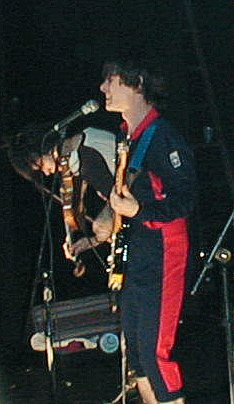 BC: Well that was just because I turned on to that Caetano record, and I don’t really know exactly what that song’s about, but I know the lyrics were all about when he was in exile in London and he’s not happy about the situation and it’s a letter to his sister. The more I knew about the background to the song the less I wanted to know because it was preventing me singing it. So I kinda did it as a combination between Curtis Mayfield and Lou Rawls, where the falsetto is the Curtis part and the “Owh Maria!”, with a bit of Disco coming in, is the Chicago House influence in there. For me I just thought it was a great song, one of the few Caetano songs I thought I could actually approach and it was in English. With that opening line, especially the way he delivers it, “Everybody knows that the cities were built to be destroyed”, and I was like “Yess!!” What a downer – I love it! That was Michael Zarangs, when he came in and did that percussion over it, it was like “Ah, wow, so nice”. Yeah, I’ve spent a long time singing that one, because I wanted it to be almost as good as I can be.
BC: Well that was just because I turned on to that Caetano record, and I don’t really know exactly what that song’s about, but I know the lyrics were all about when he was in exile in London and he’s not happy about the situation and it’s a letter to his sister. The more I knew about the background to the song the less I wanted to know because it was preventing me singing it. So I kinda did it as a combination between Curtis Mayfield and Lou Rawls, where the falsetto is the Curtis part and the “Owh Maria!”, with a bit of Disco coming in, is the Chicago House influence in there. For me I just thought it was a great song, one of the few Caetano songs I thought I could actually approach and it was in English. With that opening line, especially the way he delivers it, “Everybody knows that the cities were built to be destroyed”, and I was like “Yess!!” What a downer – I love it! That was Michael Zarangs, when he came in and did that percussion over it, it was like “Ah, wow, so nice”. Yeah, I’ve spent a long time singing that one, because I wanted it to be almost as good as I can be.
FREQ: It came out pretty good.
BC: Yeah, I really like that EP, but people received it in an odd way. I think they felt gipped that it wasn’t as fully realised as Rise Up! is supposed to be. But you know the thing about Rise Up!, it’s like what John Lennon said about Sgt Pepper: “It’s the first concept record, except there’s no fucking concept”. The concept is like the first song and the last song are kinda the same song, but other than that, there’s nothing, there’s no no connection really between any of those songs.
FREQ: There’s a mood.
BC: There’s a mood that connects Rise Up!, it holds together as a piece, but that Nilsson Schmilsson record, there’s no mood there. Every song makes you think “What? Is this the same record? What the fuck?”
FREQ: And then when you get the bass continuing on from “Without You” to the next track “Maria B” it just segues in nicely. You did that with the first album where there’s some good songs on it, some excellent songs on it, and moments that went off into more abstract directions.
BC: I like records where every song just folds into the next, because that’s like my psychedelic thing. For me eveything should be like that. We’re not there yet with this live set, but once we have mastered the material, I want it essentially to be just a giant 45 minute medley that blends with these segues.
And now there’s the official Bobby Conn website too.

